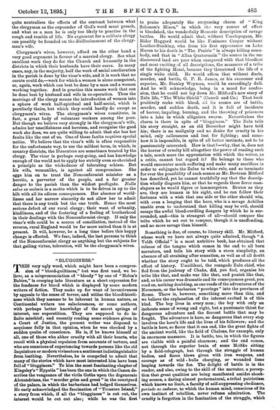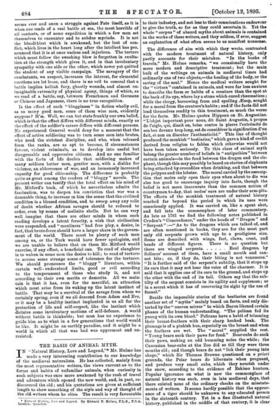"BLUGGINESS."
THIS very ugly word, which might have been a compres- sion of " blood-guiltiness," but was first used, we be- lieve, as a mispronunciation of " bloody " by one of "Helen's Babies," is creeping into literature as a short expression for the fondness for blood which is displayed by some modern writers of fiction. They make up for want of inventiveness by appeals to the sense of terror, and utilise the bloodthirsti- ness which they assume to be inherent in human nature, as Continental writers use salaciousness, or some authors, with perhaps better knowledge of the secret springs of interest, use superstition. They are supposed to do in- finite mischief ; and recently reading some evidence given in a Court of Justice, the present writer was disposed to acquiesce fully in that opinion, when he was checked by a sudden qualm of conscience. He is, if he knows himself at all, one of those who abhor cruelty with all their hearts, who recoil with a physical repulsion from accounts of torture, and who are conscious of experiencing towards persons like the old Inquisitors or modern vivisectors a sentiment indistinguishable from loathing. Nevertheless, he is compelled to admit that many of the stories which have most interested him have been full of " blugginess." To him the most fascinating chapter of Kingsley's " Hypatia " has been the one in which the Canon de- scribes the vengeance of the virile Gotha upon the degenerate Alexandrian, the " murder grim and great " in the courtyard of the palace, in which the barbarians had lodged themselves. He early acknowledged the fascination of " Treasure Island," a story from which, if all the " blugginess" is cut out, the interest would be cut out also; while he was the first
to praise adequately the surpassing charm of King
Solomon's Mines," in which th3 very source of effect is bloodshed, the wondelf ally Homeric description of savage battles. He would admit that, without Umslopogaas, Mr. Rider Haggard would be like Fenimore Cooper without Leather-Stocking, who from his first appearance on Lake Huron to his death in " The Prairie " is always killing some- body, and that in "Allan Qaatermain " the scenes in the un- discovered land are poor when compared with that bloodiest and most exciting of all descriptions, the massacre of a tribe of the fighting Masai, because they threatened the life of a single white child. He would affirm that without duels, murder, and battle, G. P. R. James, or his successor and superior, Mr. Stanley Weyman, would be exceedingly dell. And he will acknowledge, being in a mood for confes- sion, that he could not lay down Mr. Mitford's new story of Zulu. life, "The White Shield" (Cassell and Co.) That book positively reeks with blood, all its scenes are of battle, murder, and sudden death, and it is full of incidents of horror, impaling, burning, and the throwing of prisoners into a lake in which alligators swarm. Nevertheless the charm is there in spite of " blugginess." The Zulu tells his story straight, as an old Berserker might have told his ; there is no malignity and no desire for cruelty in his mind, only callousness and lust for fighting ; and some- how it is impossible, in spite of all better instincts, not to be passionately interested. How is that P—why, that is, does not the horror of cruelty kill altogether the power of reading such a tale, much more the appreciation with which the writer, as a critic, cannot but regard it ? He belongs to those who would encounter much suffering and make many sacrifices in order to subjugate the Zulus to white rule, and so terminate for ever the possibility of such scenes as Mr. Bertram Mitford has described, yet he cannot truthfully say that the descrip- tion wholly disgusts him, or that he regards these fierce man- slayers as he would tigers or lammergeiers. Brutes as they are, they are human in his sight, and he can follow their fortunes with a wish that one side or the other should win, with even a longing that the hero, who is a savage Achilles unable even to understand that killing may be evil, should escape the awful blood-curdling dangers by which he is sur- rounded, and—this is strangest of all—should conquer the tribe which he set out to conquer, though it is unoffending, and no more savage than himself.
Something is due, of course, to literary skill. Mr. Mitford, whose work we have not always quite admired, though " A Veldt Official" is a most nutritive book, has obtained that release of the tongue which comes in the end to all born narrators, and tells his story with a stern simplicity, an absence of all straining after sensation, as well as of all doubt whether the story ought to be told, which produces all the effect of history. Umzilikazi, the renegade Zulu chief, who fled from the jealousy of Chaka, did, you feel, organise his tribe like that, and make war like that, and punish like that, and, as his career was dramatic and its consequences great, you read on, nothing doubting, as one reads of the adventures of the Norsemen, or the barbarian " pourings " into the provinces of Rome. There is, however, something more than this, and we believe the explanation of the interest excited is of this kind. The boy lives in every man ; the boy with only an inchoate sense of wrong and right, but a passionate thirst for dangerous adventure and the fiercest battle that may be fought. The adventure is here, so dangerous that every step involves the hero's life and the lives of his followers; and the battle is here, so fierce that it can end, like the great fights of the ancient world, like the field of Chalons, for example, only in enormous massacre. It is battle, too, in which the figures are visible with a painful clearness; and the end comes, not through the superior brain of some Moltke sitting by a field-telegraph, but through the struggle of human bodies, and fierce blows given with iron weapons, and courage as of wild - bulls charging, or wounded lions leaping towards the foe. The delight of battle is in the reader, and also, owing to the skill of the narrator, a percep- tion that great qualities are being manifested amidst shock- ing scenes, a daring almost preternatural, a tribal patriotism which knows no limit, a faculty of self-suppressing obedience, perinde ac cadaver, to which the human mind, conscious of its own instinct of rebellion, never refuses admiration. The cruelty is forgotten in the fascination of the struggle, which
seems ever and anon a struggle against Fate itself, as it is when one reads of a real battle at sea, the most horrible of all contests, or of some expedition in which a few men set themselves to encounter and to subdue myriads. It is not the bloodthirst which is awakened, but the lust of con- flict, which lives in the heart long after the intellect has pro_ nounced that it is at once useless and injurious. The torture which must follow the swashing blow is forgotten in exulta- tion at the strength which gives it, and in that involuntary sympathy with one side or the other, which never yet quitted the student of any visible campaign. The savagery of the combatants, we suspect, increases the interest, for elemental emotions are let loose, and there is no veil to conceal that a battle implies hellish fury, ghastly wounds, and almost un- imaginable extremity of physical agony, things of which, as we read of a battle, say, between Frenchmen and Germans or Chinese and Japanese, there is no true recognition.
Is the effect of such " blugginess " in fiction wholly evil, as so many good men, some of them wise men, evidently suppose ? H'm. Well, we can but state frankly our own belief, which is that the effect differs with different minds, exactly as the effect of the soldier's career differs with different persons. No experienced General would deny for a moment that the effect of active soldiering was to turn some men into brutes, who need the strictest discipline, and who, when released from the ranks, are as apt to become, if circumstances favour, violent criminals, as to develop into useful but disagreeable and oppressive citizens. And no one familiar with the facts of life doubts that soldiering makes of many soldiers better men, gentler men, with a dislike for violence, an abhorrence of war, and an immensely increased capacity for good citizenship. The difference is probably quite as great among the readers of " bluggy " novels. The present writer can testify that the total effect on his mind of Mr. Mitford's book, of which he nevertheless, admits the fascination, was to deepen his conviction that war was a damnable thing, to increase in him the sense that the civilised condition is a blessed condition, and to sweep away any relic of doubt whether African savages should be reduced to order, even by means of melinite shells. But he can very well imagine that there are other minds in whom such reading develops a latent ferocity, a wish that civilisation were suspended, and " manliness " had free play, a desire, in fact, that brute-force should have a larger share in the govern- ment of the world. There must be plenty of such men among us, or the 'lark would have fewer apologists, and we are unable to believe that on them Mr. Mitford would exercise, if any effect, a beneficial one. To read of slaughter is to waken in some men the desire to kill ; to read of torture. to arouse some strange sense of tolerance for the torturer. We should pronounce the " bluggy " literature, within certain well - understood limits, good or evil according to the temperament of those who study it, and not according to their own merits or demerits. All we main- tain is that it has, even for the merciful, an attraction which must arise from its waking up the latent instinct of battle. That may be a survival of the savage from whom we certainly spring, even if we all descend from Adam and Eve, or it may be a healthy instinct implanted in us all for the protection of life and self-respect, like the instinct which dictates some involuntary motions of self-defence. A world without battle is thinkable; but man has no experience to guide him as to what in a few generations that world would be like. It might be an earthly paradise, and it might be a world in which all that was bad was uppermost and un- resisted.



















































 Previous page
Previous page